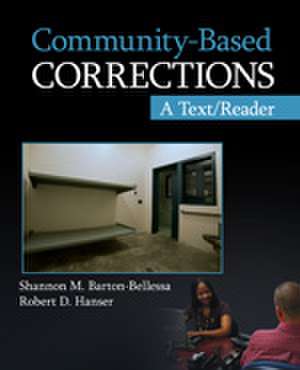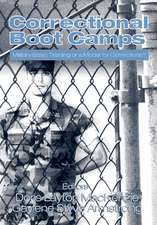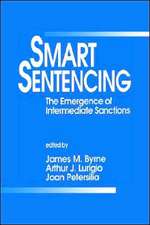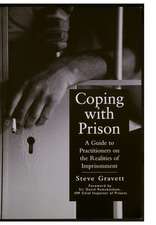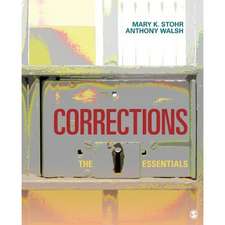Community-Based Corrections: A Text/Reader: SAGE Text/Reader Series in Criminology and Criminal Justice
Autor Shannon M. Barton-Bellessa, Robert D. Hanseren Limba Engleză Paperback – mar 2011
The book is divided into eleven Sections that will include 15 pages of authored text and 3-4 significant research-based articles with a policy orientation. The articles will provide the reader with a grasp of the development and current status of research on the various community-based corrections topics.
Ancillaries include instructor and student resource sites. Instructors will be provided test questions and PowerPoint slides. Materials on the student study site will include self-study quizzes and extra articles for each section of the book.
Preț: 847.68 lei
Preț vechi: 1161.20 lei
-27% Nou
Puncte Express: 1272
Preț estimativ în valută:
162.23€ • 168.74$ • 133.93£
162.23€ • 168.74$ • 133.93£
Carte tipărită la comandă
Livrare economică 14-28 aprilie
Preluare comenzi: 021 569.72.76
Specificații
ISBN-13: 9781412987462
ISBN-10: 1412987466
Pagini: 656
Dimensiuni: 187 x 232 x 24 mm
Greutate: 0.98 kg
Ediția:1
Editura: SAGE Publications
Colecția Sage Publications, Inc
Seria SAGE Text/Reader Series in Criminology and Criminal Justice
Locul publicării:Thousand Oaks, United States
ISBN-10: 1412987466
Pagini: 656
Dimensiuni: 187 x 232 x 24 mm
Greutate: 0.98 kg
Ediția:1
Editura: SAGE Publications
Colecția Sage Publications, Inc
Seria SAGE Text/Reader Series in Criminology and Criminal Justice
Locul publicării:Thousand Oaks, United States
Cuprins
Foreword
Preface
Acknowledgments
Section I. History and Development of Community-Based Corrections
How to Read a Research Article
Readings:
1. The Ethics of Community-Based Sanctions, by Andrew von Hirsch
2. What Influences Offenders' Willingness to Serve Alternative Sanctions? by David C. May and Peter B. Wood
3. When the Policy Becomes the Problem: Criminal Justice in the New Millennium, by Sara Steen and Rachel Bandy
Section II. Pretrial Release and Diversion
Readings:
4. The Impact of Gender and Race-Ethnicity in the Pretrial Release Process, by Stephen Demuth and Darrell Steffensmeier
5. State Administration of Drug Courts: Exploring Issues of Authority, Funding, and Legitimacy, by Cary Heck and Aaron Roussell
Section III. Restorative Justice
Readings:
6. Restorative Practices in Instituttional Settings and at Release: Victim Wrap Around Programs, by Martha Henderson Hurley
7. The Effectiveness of Restorative Justice Practices: A Meta-Analysis, by Jeff Latimer, Craig Dowden, and Danielle Muise
Section IV. The Viability of Treatment Perspectives
Readings:
8. A Quasi-Experimental Evaluation of Thinking for a Change: A "Real-World" Application, by Christopher T. Lowenkamp, Dana Hubbard, Matthew D. Makarios, and Edward J. Latessa
9. Offender Coercion in Treatment: A Meta-Analysis of Effectiveness, by Karen K. Parhar, J. Stephen Wormith, Dena M. Derkzen, and Adele M. Beauregard
Section V. Assessment and Risk Prediction
Readings:
10. The LSI-R and the COMPAS: Validation Data on Two Risk-Needs Tools, by Tracy L. Fass, Kirk Heilbrun, David DeMatteo, and Ralph Fretz
11. Can 14,737 Women Be Wrong? A Meta-Analysis of the LSI-R and Recidivism for Female Offenders, by Paula Smith, Francis T. Cullen, and Edward J. Latessa
Section VI. Probation Management and Case Planning
Readings:
12. Attorney Views on the Use of Private Agencies for Probation Supervision and Treatment, by Leanne Fiftal Alarid and Christine S. Schloss
13. From the Inside: The Meaning of Probation to Probationers, by Brandon K. Applegate, Hayden P. Smith, Alicia H. Sitren, and Nicolette Fariello Springer
14. Gender Matters: Differences in State Probation Officer Stress, by Terry Wells, Sharla Colbert, and Risdon N. Slate
Section VII. Community-Based Residential Intermediate Sanctions
Readings:
15. Removing a Nail From the Boot Camp Coffin: An Outcome Evaluation of Minnesota's Challenge Incarceration Program, by Grant Duwe and Deborah Kerschner
16. Post-Release Substance Abuse Treatment for Criminal Offenders: A Cost-Effectiveness Analysis, by Kathryn E. McCollister, Michael T. French, James A. Inciardi, Clifford A. Butzin, Steven S. Martin, and Robert M. Hooper
Section VIII. Community-Based Nonresidential and Economic Intermediate Sanctions
Readings:
17. The Effectiveness of Community Service Sentences Compared to Traditional Fines for Low-Level Offenders, by Jeffrey A. Bouffard and Lisa R. Mufti
18. Day Reporting Center Completion: Comparison of Individual and Multilevel Models, by Amy Craddock
19. Under Surveillance: An Empirical Test of the Effectiveness and Consequences of Electronic Monitoring, by Kathy G. Padgett, William D. Bales, and Thomas G. Blomberg
Section IX. Parole Management, Case Planning, and Reentry
Readings:
20. Does Parole Work? - Revisited: Reframing the Discussion of the Impact of Postprison Supervision on Offender Outcome, by Melinda D. Schlager and Kelly Robbins
21. "Punishment on the Installment Plan": Individual-Level Predictors of Parole Revocations in Four States, by Sara Steen and Tara Opsal
Section X. Juvenile Offenders
Readings:
22. An Experimental Juvenile Probation Program: Effects on Parent and Peer Relationships, by Eve Brank, Jodi Lane, Susan Turner, Terry Fain, and Amber Sehgal
23. Reconciling the Differences Between the "Gender-Responsive" and the "What Works" Literatures to Improve Services for Girls, by Dana Jones Hubbard and Betsy Matthews
Section XI. Specialized and Problematic Offender Typologies in a Changing Era
Readings:
24. Closing the Revolving Door? Substance Abuse Treatment as an Alternative to Traditional Sentencing for Drug-Dependent Offenders, by Tara D. Warner and John H. Kramer
25. Assessment of Community Reintegration on Planning for Sex Offenders: Poor Planning Predicts Recidivism, by Gwenda M. Willis and Randolph C. Grace
Glossary
References
Credits and Sources
Index
About the Authors
Preface
Acknowledgments
Section I. History and Development of Community-Based Corrections
How to Read a Research Article
Readings:
1. The Ethics of Community-Based Sanctions, by Andrew von Hirsch
2. What Influences Offenders' Willingness to Serve Alternative Sanctions? by David C. May and Peter B. Wood
3. When the Policy Becomes the Problem: Criminal Justice in the New Millennium, by Sara Steen and Rachel Bandy
Section II. Pretrial Release and Diversion
Readings:
4. The Impact of Gender and Race-Ethnicity in the Pretrial Release Process, by Stephen Demuth and Darrell Steffensmeier
5. State Administration of Drug Courts: Exploring Issues of Authority, Funding, and Legitimacy, by Cary Heck and Aaron Roussell
Section III. Restorative Justice
Readings:
6. Restorative Practices in Instituttional Settings and at Release: Victim Wrap Around Programs, by Martha Henderson Hurley
7. The Effectiveness of Restorative Justice Practices: A Meta-Analysis, by Jeff Latimer, Craig Dowden, and Danielle Muise
Section IV. The Viability of Treatment Perspectives
Readings:
8. A Quasi-Experimental Evaluation of Thinking for a Change: A "Real-World" Application, by Christopher T. Lowenkamp, Dana Hubbard, Matthew D. Makarios, and Edward J. Latessa
9. Offender Coercion in Treatment: A Meta-Analysis of Effectiveness, by Karen K. Parhar, J. Stephen Wormith, Dena M. Derkzen, and Adele M. Beauregard
Section V. Assessment and Risk Prediction
Readings:
10. The LSI-R and the COMPAS: Validation Data on Two Risk-Needs Tools, by Tracy L. Fass, Kirk Heilbrun, David DeMatteo, and Ralph Fretz
11. Can 14,737 Women Be Wrong? A Meta-Analysis of the LSI-R and Recidivism for Female Offenders, by Paula Smith, Francis T. Cullen, and Edward J. Latessa
Section VI. Probation Management and Case Planning
Readings:
12. Attorney Views on the Use of Private Agencies for Probation Supervision and Treatment, by Leanne Fiftal Alarid and Christine S. Schloss
13. From the Inside: The Meaning of Probation to Probationers, by Brandon K. Applegate, Hayden P. Smith, Alicia H. Sitren, and Nicolette Fariello Springer
14. Gender Matters: Differences in State Probation Officer Stress, by Terry Wells, Sharla Colbert, and Risdon N. Slate
Section VII. Community-Based Residential Intermediate Sanctions
Readings:
15. Removing a Nail From the Boot Camp Coffin: An Outcome Evaluation of Minnesota's Challenge Incarceration Program, by Grant Duwe and Deborah Kerschner
16. Post-Release Substance Abuse Treatment for Criminal Offenders: A Cost-Effectiveness Analysis, by Kathryn E. McCollister, Michael T. French, James A. Inciardi, Clifford A. Butzin, Steven S. Martin, and Robert M. Hooper
Section VIII. Community-Based Nonresidential and Economic Intermediate Sanctions
Readings:
17. The Effectiveness of Community Service Sentences Compared to Traditional Fines for Low-Level Offenders, by Jeffrey A. Bouffard and Lisa R. Mufti
18. Day Reporting Center Completion: Comparison of Individual and Multilevel Models, by Amy Craddock
19. Under Surveillance: An Empirical Test of the Effectiveness and Consequences of Electronic Monitoring, by Kathy G. Padgett, William D. Bales, and Thomas G. Blomberg
Section IX. Parole Management, Case Planning, and Reentry
Readings:
20. Does Parole Work? - Revisited: Reframing the Discussion of the Impact of Postprison Supervision on Offender Outcome, by Melinda D. Schlager and Kelly Robbins
21. "Punishment on the Installment Plan": Individual-Level Predictors of Parole Revocations in Four States, by Sara Steen and Tara Opsal
Section X. Juvenile Offenders
Readings:
22. An Experimental Juvenile Probation Program: Effects on Parent and Peer Relationships, by Eve Brank, Jodi Lane, Susan Turner, Terry Fain, and Amber Sehgal
23. Reconciling the Differences Between the "Gender-Responsive" and the "What Works" Literatures to Improve Services for Girls, by Dana Jones Hubbard and Betsy Matthews
Section XI. Specialized and Problematic Offender Typologies in a Changing Era
Readings:
24. Closing the Revolving Door? Substance Abuse Treatment as an Alternative to Traditional Sentencing for Drug-Dependent Offenders, by Tara D. Warner and John H. Kramer
25. Assessment of Community Reintegration on Planning for Sex Offenders: Poor Planning Predicts Recidivism, by Gwenda M. Willis and Randolph C. Grace
Glossary
References
Credits and Sources
Index
About the Authors
Notă biografică
Shannon M. Barton-Bellessa is a professor of criminology and criminal justice at Indiana State University. She earned her undergraduate degree from Kentucky Wesleyan College, her master¿s degree from Eastern Kentucky University, and her PhD from the University of Cincinnati. Her journal publications have been in the area of community corrections, correctional officer job satisfaction, cognitive programming, and the juvenile justice system.
Descriere
Community-Based Corrections covers the necessary topics in community corrections enriched with edited articles taken from current research literature. This unique text/reader format presents a more practical viewpoint than other texts on the market. The authors' expertise with both special needs populations and in the comparative field give the book a unique perspective.
